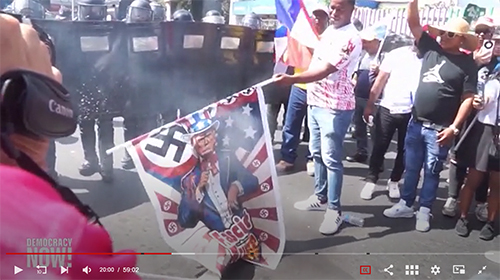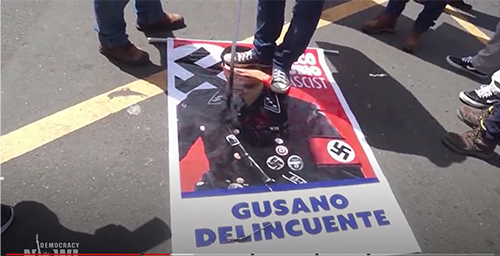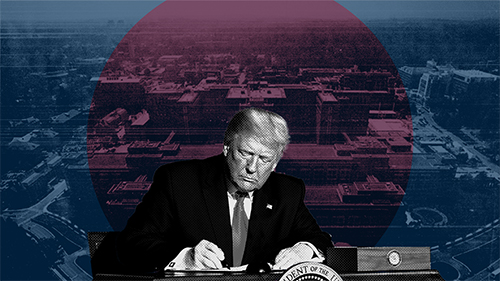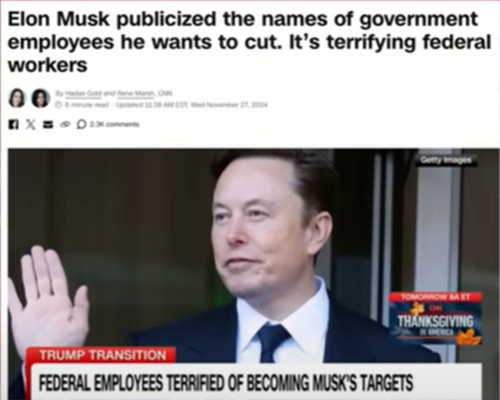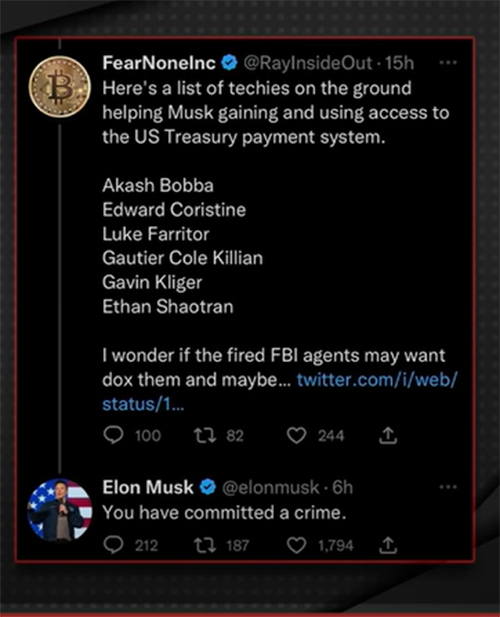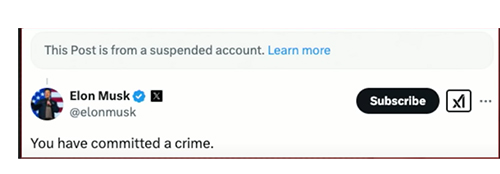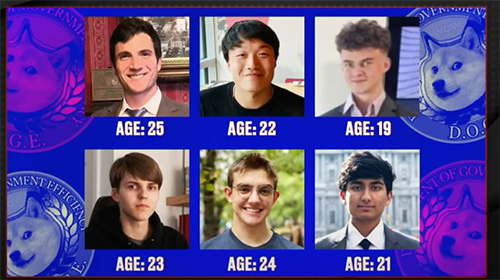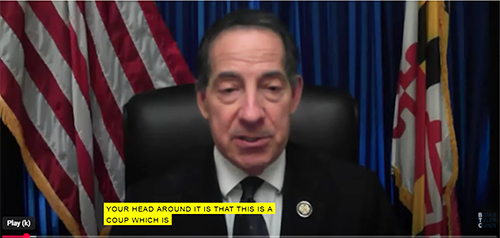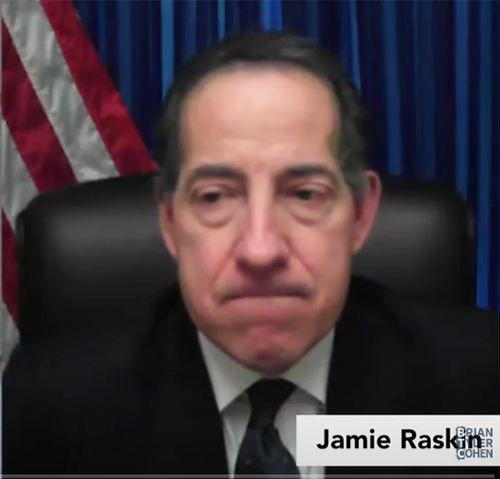by Amy Goodman
DemocracyNow!
February 04, 2025
https://www.democracynow.org/2025/2/4/t ... transcript
Secretary of State Marco Rubio is visiting Latin America on his first foreign trip in his new post. One of his stops is Panama, where President Trump has threatened to invade and take over control of the critical trade route of the Panama Canal in response to its growing ties to China. It is a deeply unpopular proposition in Panama, seen as a “reversion to the mid-20th century imperial encroachment that Panama so intentionally confronted over the course of the Canal transition.” It is also, “on a logistical level,” essentially “impossible,” according to Panama City-based scholar Miriam Pensack. In what Pensack calls a “troubling” development, Panama has announced it will more closely cooperate with Trump’s policing of migration from Central America to the United States as a diplomatic concession to his threats.
Transcript
This is a rush transcript. Copy may not be in its final form.
AMY GOODMAN: U.S. Secretary of State Marco Rubio is traveling to Costa Rica and Guatemala City today before heading to the Dominican Republic as part of his first foreign trip in his new post. Rubio was just in Panama and El Salvador.
After meeting with Rubio on Monday, El Salvador’s President Nayib Bukele announced in a statement his country would receive immigrants and asylum seekers of any nationality deported from the United States. He also offered to jail U.S. citizens who are convicted of crimes for a fee in El Salvador’s troubled maximum-security mega-prison complex. Bukele said the fee would be, quote, “low for the U.S. but significant for us, making our entire prison system sustainable,” he said. Rubio spoke on Monday.
SECRETARY OF STATE MARCO RUBIO: He has agreed to accept for deportation any illegal alien in the United States who is a criminal, from any nationality, be they MS-13 or Tren de Aragua, and house them in his jails. And third, he has offered to house in his jails dangerous American criminals in custody in our country, including those of U.S. citizenship and legal residence.
AMY GOODMAN: Secretary of State Rubio praised Salvadoran President Bukele, who’s been accused of gross human rights abuses and of violating Salvador’s constitution by remaining in power for a third presidential term. Bukele has been enforcing a state of emergency for nearly three years, leading to the detention of over 83,000 people without access to due process. Human rights groups estimate hundreds of people have died in Bukele’s prisons since March 2022.
This comes after far-right immigration hard-liner, White House Deputy Chief of Staff for Policy Stephen Miller said last week Bukele could become one of the strongest partners in the Central American region.
STEPHEN MILLER: The president, Bukele, has graciously offered tremendous degrees of cooperation with the United States on all things migration. And we’re hoping that will provide a framework for migration cooperation all throughout the region. And I think it’s very clear that President Bukele is going to be a very great and strong partner for this administration and for the United States.
AMY GOODMAN: Trump has long admired El Salvador’s prisons. The Trump administration is working with El Salvador on what is known as a safe third country agreement that would allow the U.S. to block migrants from requesting asylum in the U.S. and deport them to El Salvador, which would be designated a safe third country where they could seek asylum.
Rubio’s began his trip in Panama, though, as Trump reiterated his threat to retake the Panama Canal, claiming it’s being operated by China.
PRESIDENT DONALD TRUMP: China is running the Panama Canal. That was not given to China. That was given to Panama, foolishly. But they’ve violated the agreement, and we’re going to take it back, or something very powerful is going to happen. … I don’t think troops will be necessary in Panama. What Panama has done is terrible for national security for this part of the world. And, you know, 70% of the signage on the Panama Canal was written in Chinese. That’s not right. It wasn’t meant for China.
AMY GOODMAN: Speaking to reporters, Panama’s President José Raúl Mulino said he may expand an existing agreement with the U.S. to begin direct deportations of non-Panamanian migrants who make the dangerous journey through the Darién Gap jungle along Panama’s southern border with Colombia.
PRESIDENT JOSÉ RAÚL MULINO: [translated] On the aspect of immigration, we agreed to explore the possibility of expanding the memorandum of understanding that we signed on July 1st along with United States Department of Homeland Security to better articulate the issue of repatriation from the Darién. Anything that is going to be done, I’ve offered the area of the Nicanor track, the Metetí, Darién, so that it is from where the process of repatriation of people from different parts, such as Venezuela, Colombia, Ecuador, among other nationalities, is supplied.
AMY GOODMAN: All of this comes as one country is not on Rubio’s itinerary, Cuba, which he was asked about on Fox News, as the State Department website now outlines a plan for, quote, “Restoring a Tough U.S.-Cuba Policy.”
SECRETARY OF STATE MARCO RUBIO: I have no intention of going to Havana with his regime in place, other than to discuss when they’re going to leave.
AMY GOODMAN: But Trump has announced plans to hold some 30,000 immigrants and asylum seekers in a mass detention camp at Guantánamo Bay in Cuba on the U.S. naval base there.
For more, we’re joined by two guests. Roman Gressier is a French American journalist based in Guatemala City, where he’s the editor of El Faro English and host of the podcast Central America in Minutes. And in Panama City, we’re joined by Miriam Pensack, postdoctoral fellow in the History Department at Princeton University, historian of modern Latin America.
We welcome you both to Democracy Now! Miriam, let’s begin with you. You’re in Panama City. Rubio was just there. He’s saying he’s taking Panama Canal back, essentially, from China. Can you talk about the threats and what the Panamanian president agreed to?
MIRIAM PENSACK: Hi, Amy. Thank you for having me.
Yes, so, Rubio was here. He arrived Saturday night. He had a two-hour meeting, one hour privately with Mulino and then another hour with his ministers. Afterwards, Mulino gave a press conference in which he essentially said, “Don’t worry. We won’t be invaded” — which the fact that that was one of the first things he had to say is, of course, a bit troubling, to say the least.
What Panama has agreed to, effectively, is to further collaborate on immigration, or, rather, deportation and repatriation for migrants moving through the Darién Gap. There has already been a pretty extensive degree of collaboration between the United States government and the Panamanian equivalent of the Border Patrol, which is called SENAFRONT. There’s an ICE office in the U.S. Embassy here in Panama City. So, that collaboration has been underway for a long time.
Something that Rubio did mention and Mulino agreed to is this use of this airstrip in the Darién, which has a certain degree of, I suppose, geographic utility insofar as Panama is this infrastructural hub for the Americas in general. On Monday, yesterday, Rubio oversaw a deportation flight leaving from the former U.S. base at Albrook in Panama City to repatriate — or, deport, rather, upwards of 40 Colombians who came from the United States.
So, that’s what we’ve seen so far. There’s still a lot of pressure in terms of undoing the relationship with China that Panama has forged since it took up formal diplomatic relations with Beijing in 2017.
JUAN GONZÁLEZ: And, Miriam, could you talk to us more about the current president of Panama, Mulino? Because there were mass protests not only to Rubio’s visit, but against Mulino’s administration, as well. How is he seen among the Panamanian people in terms of his connection or relations to the U.S.?
MIRIAM PENSACK: Sure. So, Panama, in general, it should be stated — and Rubio mentioned this — Panama is, you know, extremely friendly to the United States and to U.S. interests. It’s very pro-business. There’s really no meaningful articulation of the left in terms of electoral politics here.
Something that has happened with Mulino’s government, you know, he’s amidst a reform of the Social Security and pension system here, which will be unpopular. So these threats from the United States have, I think, to a certain degree, united the country behind him, which he can probably use to push through legislation and pension reforms and things of that nature.
Now, that being said, sovereignty has long been, understandably, because of the former Panama Canal Zone here that was operated exclusively by the United States for the majority of the 20th century — Panama has long been concerned with the question of sovereignty. So, kowtowing to the United States on these issues is not popular, shall we say? Some of the protests that you saw, the burning of American flags, posters of Rubio with swastikas over his face, things like that, most of that is carried out by a syndicalist group, a sort of union conglomerate, if you will, called SUNTRACS. They shut down the city, many streets on Friday. They protested in front of the U.S. Embassy. And there is just this notion that this is a reversion to the sort of mid-20th century imperial encroachment that Panama so intentionally confronted over the course of the canal transition in the last two decades of the 20th century.
President Trump, Fascist
Marco Rubio, Fascist
JUAN GONZÁLEZ: And this whole issue of Chinese alleged control of the canal, the reality is, Panama became the first country in Latin America to sign on to the Belt and Road Initiative of infrastructure projects of China, but there are now 22 countries in Latin America who are part of the Belt and Road Initiative. The importance of Mulino saying that they’re going to review and possibly withdraw from the Belt and Road Initiative? And how expensive is Chinese investment in Panama, given the fact that the United States has largely ignored major investments in much of the region?
MIRIAM PENSACK: Sure. So, yes, the question of China. In 2017, under the government of Juan Carlos Varela, Panama did what a lot of the region has done in recent years, which is to cut ties with Taiwan and to formalize relations with Beijing, at which point there was certainly an uptick and entrance into this Belt and Roads Initiative that you mentioned, so an uptick in Chinese investment, a sort of movement towards greater trade with China.
Something that bears mentioning is that following the election of Donald Trump, the U.S. ambassador, then-ambassador, departed not long after. And in fact, the Trump administration and the State Department appointed no ambassador to Panama for, effectively, the entirety of the first Trump administration. So, this really left — as Mulino said in his speech, his press conference following his meeting with Rubio, this left a lot of empty chairs, into which China slid.
So, this Belt and Roads Initiative, Mulino said that he will not renew the agreement. That was one of the concessions that he offered Rubio and the United States. He also sort of got ahead of things. This happened in early January. So, maybe after the first or second time that Trump mentioned that he was going to, quote, “retake the Panama Canal,” he began auditing the — Mulino, excuse me — Mulino began auditing the Hong Kong-based company that won concession bids to operate these two ports on the Atlantic and Pacific side of the canal. So, that audit was, I think, a sort of preemptive attempt to hopefully find — you know, hopefully for the Panamanian government, it would be a fortuitous out to their current predicament — to hopefully find some degree of wrongdoing in the bookkeeping, something to that effect, so that there would be a reason to annul the contracts and potentially open up bids to U.S. companies to take control of those ports.
AMY GOODMAN: Miriam Pensack, very quickly, what would it take for the U.S. to, quote, “take back” — what Trump keeps threatening — take back the Panama Canal?
MIRIAM PENSACK: On a logistical level, it’s impossible, because the entity that runs the Panama Canal, an autonomous — effectively, a state within a state of Panama, the Panama Canal Authority, operates the lock system and the pilot system, which moves — you know, it sort of leads these large container ships through the canal. It’s run by roughly 8,800 Panamanian employees. So, the notion that the United States could take over that — you know, the transition to have Panama take over that operation required 23 years of collaboration between the two governments. So the notion that that can be done overnight with something like, say, an executive order, or something to that effect, on a logistical level, is quite impossible.
***
Trump-Bukele Alliance Grows as El Salvador Offers to Imprison U.S. Citizens & Deported Migrants
by Amy Goodman
DemocracyNow!
February 04, 2025
https://www.democracynow.org/2025/2/4/r ... in_america
As Secretary of State Marco Rubio visits Latin America on his first foreign trip in his new post, we look at the Trump administration’s policy orientation toward the right-wing government of El Salvador and the left-wing government of Guatemala with journalist Roman Gressier. Rubio is visiting both countries during his trip, which is expected to cement Trump’s ties to Salvadoran strongman enthusiast Nayib Bukele and to the conservative opposition in Guatemala. Rubio’s top agenda items are anti-immigration enforcement and U.S. competition with China.
Transcript
This is a rush transcript. Copy may not be in its final form.
AMY GOODMAN: We want to bring Roman Gressier into this conversation. He’s in Guatemala City, where Secretary of State Rubio will be. Roman, first we want to talk about what happened in Salvador. President Trump made his first call to a foreign leader, Saudi Arabia. His second was to Bukele in El Salvador. And now Bukele, as Rubio was just leaving there, has promised to imprison American prisoners for a fee at the much admired, by Trump, but horrified by human rights groups, prison system in El Salvador and also to take deportees from any country. The significance of this?
ROMAN GRESSIER: Hi. It’s great to be back with you.
Look, I think, in terms of the legal U.S. courts question and international law, I’m not sure how that latter promise will play out. But what we can observe is that a — look, Bukele was close to Trump in his first term, and this is a way of cementing that closeness into a migration-driven alliance in his second term.
From the rhetorical, where we saw a couple months ago, last June to be exact, we saw Trump Jr., we saw Tucker Carlson and other figures in the MAGA sphere at Bukele’s unconstitutional inauguration of his second term, and that was already on the rhetorical end. And then there’s the anti-woke discourse that they share and a certain affinity rhetorically again. And then, now they’re moving more formally into the realm of migration cooperation.
Now, in 2019, the Trump administration had negotiated with El Salvador a safe third country agreement. And this would clearly, at least on the rhetorical end, go much further than that. We’ll have to see what actually — parsing the language a little bit, Rubio said that Bukele had “offered” to receive U.S. citizens convicted of crimes and incarcerated in the United States. But the other things were “Bukele agreed to.” So I think that the Tren de Aragua and MS-13 deportees are perhaps more immediately likely or possible than the latter.
JUAN GONZÁLEZ: And, Roman, I wanted to ask you — of the five countries that Rubio is visiting, all of them have relatively conservative governments, and with the exception of Guatemala. What do you expect — what’s your sense of what Rubio hopes to get out of Guatemala and how that government may respond?
ROMAN GRESSIER: I think migration is the item of the day. Rubio will be arriving this afternoon, and he’ll be here tomorrow — excuse me. And tomorrow afternoon, he’ll be giving a press conference summing up his Guatemala trip.
The Arévalo administration, since the transition, has been meeting with Trump officials and the Heritage Foundation to promote the idea that they can get along and that, as they told the U.S. press on background — I don’t think they wanted to put a name to it, perhaps for optics, but they told the U.S. press on background that the Arévalo administration would be open to discussing the possibility of receiving regional return deportees. So, I think, on that plane, that will be a topic of discussion, and it’s certainly of interest to Marco Rubio.
But there’s a broader political issue where the Arévalo administration has been trying to send the signal that they can get along, in part because the public prosecutor’s office, which has been working to — which first worked to prevent Arévalo from taking office in January 2024, has now been working to put him on trial, remove him from office, etc. And just last week, the Supreme Court decided to move forward with a probe of Arévalo that could possibly lead to the revocation of his immunity from prosecution. Anyhow, it’s a very drawn-out process, but the Supreme Court kicked the ball forward on that last week. So I think that domestic context is very important, given that the attorney general and her office have been eagerly courting Trump’s support and trying to promote the idea that they defend a conservative agenda.
JUAN GONZÁLEZ: And I’m wondering if you could — if we could look back at the broader picture of this indication of the Trump administration focusing on Latin America in its first days in office, ostensibly over the migration crisis and fentanyl, but also over China’s growing influence. Isn’t the reality already that China has become the main economic partner of South America? It’s the largest trading partner with South America and the second largest with Latin America as a whole. So, really, the United States has been for now decades losing control of the markets of Latin America for its goods. Your sense of whether this has any impact on how the Trump administration is approaching the region?
ROMAN GRESSIER: Yeah, I think you’re right about that. It does have Marco Rubio’s fingerprint on it. And even in his recent Senate hearings during the Biden administration, he would frequently talk about Chinese influence in the region. Honduras broke relations with Taiwan two years ago. And Guatemala and Belize, which is part of the Commonwealth, the British Commonwealth, are the only two remaining countries now. Guatemala has kind of a balancing act, where they maintain historic relations with Taiwan while also having informal commercial ties to China. And I think that that could possibly be a topic of discussion for the visit, too, especially given that Marco Rubio is very interested in China policy as it pertains to Central America and the broader region, as you pointed out.
AMY GOODMAN: And very quickly, Roman, Latin America and particularly Central America, a place for the Trump administration to actually make money. You have President Trump’s nominee to be secretary of commerce, Howard Lutnick, also has ties to El Salvador. He’s the billionaire CEO of the Wall Street firm Cantor Fitzgerald, which is a major backer of Tether, a cryptocurrency firm that recently announced it’s relocating to El Salvador. Bloomberg recently ran an article headlined “Commerce Nominee Lutnick Is Backer of Outlaws’ Favorite Cryptocurrency.” The article states that Tether is used by, quote, “drug traffickers, terrorists and scammers to move money around the world.” Your response, Roman?
ROMAN GRESSIER: I don’t want to get in over my head on that. I wasn’t aware of Lutnick’s relationship, but it is true that Tether does have a presence in El Salvador. And an array of cryptocurrency companies, major players on the global scale, have had some type of presence in El Salvador since 2021, when the bitcoin law was passed, though I would note that the bitcoin law was basically gutted in recent days. And, for example, any language referencing bitcoin as moneda, or currency, was struck from the law, among others, as part of an IMF financing deal. So, I’m not sure what exactly the political implications would be of Lutnick’s appointment, but we’ll have to watch and see.

